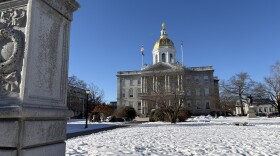New England homes are known for being drafty. But, energy efficiency enthusiasts say, they don’t have to stay that way.
With colder temperatures approaching, New Hampshire’s utility companies are trying to spread the word about programs that can help make cold, leaky homes more energy efficient.
New Hampshire Saves, run by the state’s utility companies, provides programs that will cover about 75% of the cost of efficiency upgrades, or 100% of the cost for lower-income households.
In 2023, the program served more than 97,000 customers and saved enough electricity to power more than 115,000 homes for a year, according to a program review done by NH Saves.
New Hampshire is ranked 19th in the country on its energy efficiency programs, according to the American Council for an Energy Efficient Economy.
Kate Peters, an energy efficiency director at Eversource, said the first step is to sign up online for an energy audit. A contractor will look through the house to examine how it’s using energy. Then, the customer will get a list of recommendations to save energy.
“Maybe it's an additional layer of insulation in the attic and some air sealing, which is sealing up those leaks and cracks that have been found where cold air is getting in. Plus some insulation in the basement. That may be a typical package,” she said.
With an average project, a household could expect to save 20% on yearly heating and cooling costs.
Households can also use rebates from New Hampshire Saves to help pay for things like efficient washers and dryers, water heaters, refrigerators, and air purifiers.
Additional rebates may be available in the coming years for efficient heating systems and appliances, as well as more weatherization work like insulation and air sealing. New Hampshire is expecting about $70 million from the Inflation Reduction Act for those programs.
Energy efficiency work through New Hampshire Saves was halted and some projects were reduced in size for a period of time in 2021, when plans from the state’s utility companies were held up at the Public Utilities Commission.
The plans were eventually approved, and energy efficiency work restarted, after lawmakers passed a bill that put rates that fund energy efficiency into state law. Those programs are funded by a portion of utility bills called the system benefits charge that amounts to a few dollars each month per household.
Mike Turcotte, who runs the energy efficiency contracting company Turn Cycle Solutions, said things have returned to normal for his business since the 2021 interruption and business is good.
“We have had a rejuvenation,” he said.
Turn Cycle Solutions has hired more people in recent months, and they’re able to do jobs more quickly, Turcotte said.
Customers are able to get work done within several weeks – qualification takes about 24 hours, energy audits can be booked within about a week and a half, and installation takes 3 to 4 weeks, he said. And residents can find out if their home is safe, if it has good air quality, and if its energy efficiency could be improved.
In addition to programs that make homes more energy efficient, residents can also get assistance with heating fuel and electric bills through state and federal programs. The best way to connect with that assistance is through your Community Action Agency. Utility companies also offer payment plans that can reduce monthly bills.
NHPR’s guide to applying for heating and electric assistance can be found here (note: the state-funded emergency assistance program was specific to the 2022-2023 season).








